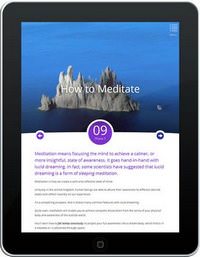9 Reasons Why Everyone Should Lucid Dream
To lucid dream is to examine an intensely heightened state of self awareness within your dreams. I believe everyone should learn how to do it at some point in their lives, to unlock profound benefits that affect how we think and feel in reality.
1. Lucid dreams create limitless freedom and escapsim
Escapism is probably the one and only reason most people initially pursue lucid dreams: to meet with their idol, to re-enact a day in the life of Jack Bauer, or to fly like an eagle over breathtaking scenery. It's a perfectly valid motivation for having lucid dreams. We all have unfulfilled desires and lucidity is an amazing way to experience out-of-this-world situations with stunning realism.

As an experienced oneironaut, you can manifest anything you want in a guided dream. It's exciting and highly creative stuff. Many people never get over their desire for escapism in lucid dreams. The important thing to remember is to reach beyond the novelty value of lucid dreaming and see the potential as it truly stands.
Learn How to Control Your Dreams
The most popular free lucid dreaming course on the web — delivered directly to your inbox. Enjoyed by over 264,554 lucid dreamers since 2013.
We respect your privacy. Unsubscribe anytime.
2. Lucid dreams reveal the astonishing power of your brain
Have a look at your surroundings right now. I mean really look. Is any of it real? How is it that you can see everything in such detail? What processes occur in your brain to make vision possible?
What if you trip your information processing and the things you can see become a little less tangible? Is what's real for you the same as what's real for me?
When you become conscious in the dream state, you have an astonishing opportunity to experience a vivid and tangible dream world that is not at all real. It's mind-expanding.
In a sleep state, where your body is processing only the tiniest amounts of external stimuli, your internal world is as rich as ever. Your brain realistically reproduces a world with houses, trees, gravity, air, and emotions, and it all feels very, very real.
While limited to the scope of your experience and unconscious imagination, the lucid dream world is still a sensational place with an uncanny capacity to mimic reality.
This special phenomenon, reserved only for those bold enough to delve into this extraordinary state of awareness, provides a safe and natural way to explore the depths of human consciousness. It has the potential to alter the way in which we regard the world around us for our whole lives.
3. Lucid dreams prompts you to question your reality
In questioning our perception, it naturally leads us to question the nature of reality; that is, the universe as it exists around us.
Some philosophies suggest that consciousness creates reality. Can we test this idea in a lucid dream world, where the dream reality truly is altered by consciousness? What is reality anyway? Is the physical universe the only reality worth accepting as true? Does our very existence spring from another universe? Are we a hypothetical outcome - Schrodinger's living cat?
These are important theoretical questions which can only really be pondered by stepping outside the box of everyday thinking. And lucid dreaming provides a useful platform from which we can reflect on our experience of reality. For instance, we can ask:
- Are dreams a type of reality or non-reality?
- Why do our dreams disobey the fundamental laws of cause and effect?
- What can our dreams reveal about the nature of physical reality?
- How can we use our lucid dreams as a lens on our experience of consciousness?
Of course, we can have no definitive answers. All we can do is theorize. But I think it is very exciting to use lucid dreams like a second life; as a comparative experience to reflect on this waking reality.
They are, indeed, probably the furthest we can travel outside of our waking experience while still retaining clarity of thought. What will you do with that amazing ability?
4. Lucid dreams allows you to communicate with your inner self
Eat your heart out Sigmund Freud. Lucid dreamers can literally talk to their own unconscious mind in the dreamscape.
I once had a nightmare, in which I was being flung by a dark pointy figure up and down a narrow hallway. I wasn't lucid at first, although I was conscious enough to feel pain and each smack really hurt. After two or three smashes I had the conscious insight to ask whether I was dreaming. Of course I was. I didn't waste any time; I marched up to the silhouette man and grab him by the shoulders.
"WHY ARE YOU DOING THIS TO ME!" I shouted. His aggression immediately turned to sadness and childish frustration. "I can't reconcile this," he said, and shoved a notepad in my hands. He has scrawled the words "be loved, love yourself", referring to a philosophical debate I had been having earlier that day: Is it more important to be loved by someone else, or to learn how to love yourself?
Clearly, my conclusion was at odds with my unconscious. There was absolutely no symbolism required. My inner child was acting out with a massive tantrum - and demanded my attention. Yet it is only when lucid that I have the opportunity to resolve such issues face-to-face.
Instead of fearing the pointy figure or wanting to banish him, I now felt empathy for him. He hadn't understood. So I explained my reasons as if he were a child. Draining away both physically and emotionally, the creature left and I woke up in awe of the childish element that arose from my unconscious self.
5. Lucid dreams are a training ground for waking life

Being a virtual reality simulation, the lucid dream world is an ideal place to practice real life skills - from the perfect flying kick to playing classical piano.
Research has revealed that we can increase our procedural memory for fine muscle movements inside a lucid dream. So, after practicing flying kicks for half an hour in a lucid dream, your kicks would literally be better upon waking.
Likewise, in the book Exploring The World of Lucid Dreaming by Stephen LaBerge and Howard Rheingold, a lucid dreaming surgeon explains how, before going to sleep at night, he would review his surgical cases for the next day. Then he would become lucid in his dreams and practice them in precise detail.
As a result, the surgeon was able to refine and polish his techniques and perform procedures much faster than the average surgeon, crediting his edge to lucid dreaming. You may not be a surgeon, nor a Taekwondo fighter, but you can probably identify important physical skills to improve upon while dreaming. From public speaking to parkour, practicing your abilities in a lucid dream can have a meaningful impact on your real-world success.
6. Lucid dreams create a totally natural high
The moment you recognize you're dreaming, it creates a rush of adrenaline and excitement. It's when you realize that you are back in lucid land, where anything and everything is possible.
This wonderful natural high stays with you throughout the dream and on waking. A deliciously memorable lucid dream has colored many of my waking days.
Whether you are a complete beginner or an expert oneironaut, we all relish the state of conscious dreaming and take away blissful new experiences almost every time it happens. Such dreams can be euphoric in nature and create memories and insights that will stay with you for the rest of your life.
Indeed, the feeling is probably one of the best natural highs we are capable of creating, in the same class as jumping out of a plane or falling in love. Just ask any lucid dreamer!
7. Lucid dreams can help you grieve
When we lose loved ones, we have the sense that there is some unfinished business. Whether the death comes suddenly without warning, or slowly and predictably, we would all take that opportunity to have another hour with the deceased.
Maybe we feel they may have messages for us (reflections on their lives) and we, too, may have messages for them (unresolved feelings of guilt or anger or simply how much we miss them). How do you resolve such unfinished business?
I don't believe in the afterlife, but lucid dreams of the dead may offer psychological therapy for the surviving individual. They provide a capacity for grieving and healing, even if you take the view that the deceased are not actually visiting you and it's just a part of your own psyche playing the role of them.
Grief dreams tend to occur naturally when you've lost someone important. Repetitive thoughts of the deceased can easily filter into our dreams, as do all kinds of emotional matters. But if your loved one doesn't appear to you at night, or you just miss them and want to give them a hug, then dreaming lucidly about them is a wonderful proposition.
Lucid dreams offer us the closure we need to overcome our grief and move on with our lives. That's not to say we want to forget. A lucid experience can enable us to consciously visit any period in our past and re-live those memories.
Playtime with a childhood pet, conversations with a late parent, and closeness with a lost partner are all powerful ways to grieve and remember loved ones through lucid dreams.
8. Lucid dreams unleash your creative potential

We all know that dreams can be a bizarre place of inspiration. The benefit, when lucid dreaming, is to be able to actively seek out creative ideas and bring them back to the waking world.
Famous painters like Salvador Dali, William Blake and Paul Klee all created artwork inspired by their dreams.
If you're seeking artistic inspiration while lucid, try heading into a gallery and study the images you find there. Step into the paintings. Explore them in detail. The imagery arises from your memory, your unconscious creativity, or a combination of both.
Best of all, such dreams also contain elements of your unconscious conceptual understanding of the world, which can make for beautiful and baffling interpretations (see Dali's One Second Before Awakening from a Dream Caused by the Flight of a Bee Around a Pomegranate, above, 1944).
Equally, lucid dreams can give way to amazing musical inspiration. Composers like Mozart, Beethoven and Wagner all pointed to dreams as the source of their creativity. Dreams reveal our most creative side because of the free-flow of ideas arising from the unconscious mind, unhindered by the rational conscious.
My partner Pete composed the piano song Lucid in a conscious dream, yet listening to its complexity you would hardly believe it was possible. Actually, he told me that the most difficult part didn't take place in the dreamscape, but in remembering his creation and reproducing it with the same depth and intensity in the waking world. It's a barrier for sure, but I am certain no creative lucid dreamer would give up this magical source of inspiration.
9. Lucid dreaming can advance the human race
Last and not least, I believe that if all human beings began harnessing the power of lucid dreams then our culture, art, technology, science, and beliefs would develop in new directions.
What if every inventor had a breakthrough lucid dream about a new innovation? Or every artist began producing dream-inspired artwork channeled by the unconscious? What if every research scientist could solve theoretical problems that had previously left us stumped?
If we all had access to lucid dreams, we could apply them to our careers, hobbies, relationships, and personal lives, tapping into astonishing and unrivalled powers within. The human race would be enriched as a result, both individually and universally. That certainly gives us something to strive for.

This article is an excerpt from the The World of Lucid Dreaming Academy, our premium lucid dreaming education platform.
Students benefit from 30 step-by-step modules in lucid dream induction and advanced control, as well as learning to use lucidity to improve their waking lives. Membership includes audio tools, guided meditations, private forums and access to our community of lucid dreamers.

















